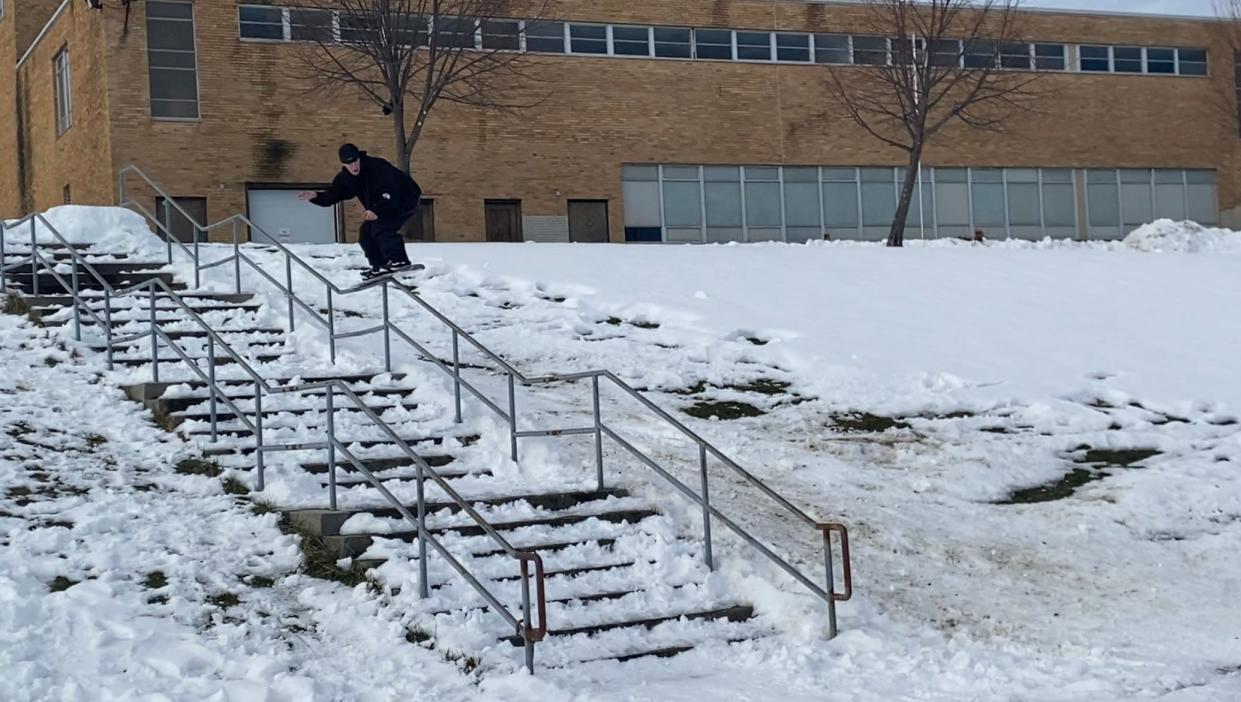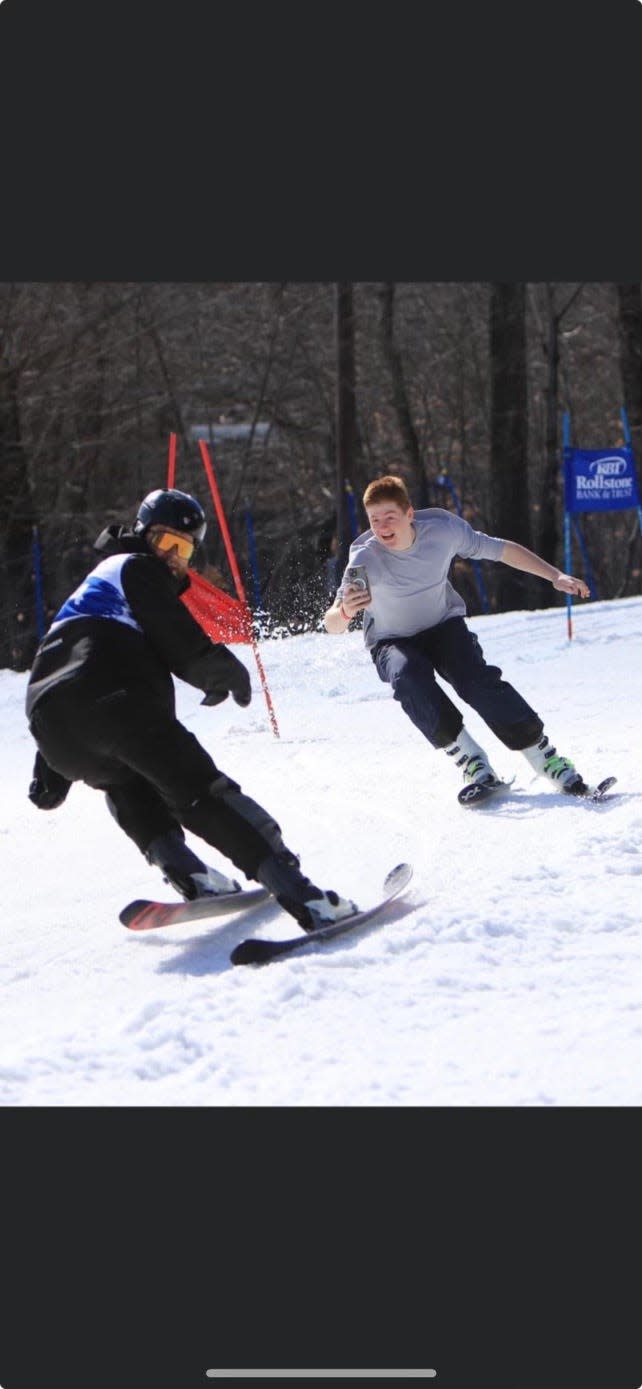Snow sports: Skiing, snowboarding indeed serve as sports for all of us
Take a look around you the next time you're skiing or snowboarding at Wachusett Mountain or other urban-proximate ski areas.
The people in the lift line, on the slopes, and in the lodge aren't all white and middle and upper-middle-class like they were a generation ago.
And listen. You'll hear Portuguese, Mandarin, Spanish and innumerable other languages being spoken.
In fact, Wachusett decided a few years ago not to use multiple foreign languages on its rental shop signage because there were just too many of them spoken by the Princeton ski area's customers. The ski area sends pre-arrival videos to newcomers bound for on-hill instruction that rely mainly on images.
"It's growing annually, but there's no question that we have had a huge diversity swing in the last 10 years," said Carolyn Crowley Stimpson, vice president of resort services at Wachusett. "We're one of the most diverse ski areas around. We're building the next generation of skiers here."
More diversity on snow
Meanwhile, a good number of the young skiers and riders you'll see at Wachusett are city kids from Boston, Worcester and Fitchburg, indicating that the sport isn't just for suburban young people anymore.
Some of this growth in diversity in skiing and snowboarding is due to demographics and immigration, with people from India, China, Brazil and Central America and many other places moving into Massachusetts cities and other cities across the country in dramatic numbers over the last decade. These new New Englanders have found jobs and careers and discovered that the best way to make our region's winters fun is to slide on snow, for relatively affordable prices compared to the bigger resorts up north and out west.
And part of it is because of the work of organizations like Y.E.S. (Youth Enrichment Services), a Boston nonprofit that for more than two decades has made skiing and snowboarding the main focus of its mission to expose urban youths to recreational and educational activities many of them would otherwise not be able to afford or even be aware of. Y.E.S. serves from 600 to 800 youths a year in the winter program.
The MBTA's ski train from Boston and the free small shuttle service that ferries skiers and riders to the ski area from the Fitchburg line's Wachusett commuter rail stop also contribute to bringing urban diversity to the ski area, Stimpson said. Also notable are the dozens of school groups Wachusett hosts throughout the ski season, including inner-city programs like the ski club from Worcester's South High School. Wachusett also has worked with the Worcester-based nonprofit You, Inc.
Saying "Y.E.S." to skiing for urban youth
Y.E.S.' history with Wachusett dates back 23 years to the organization's founding. The ski area provides the group with deeply discounted passes and lessons so the biggest cost for Y.E.S. is probably the bus rental.
For its part, the group provides — on a sliding scale according to financial need, with all participants below state media income guidelines — chaperoned weekend and weekday afternoon ski outings to Wachusett and a bunch of other ski areas including Blue Hills in Canton, Butternut in Western Massachusetts, Sunapee, Loon and Whaleback in New Hampshire and Stratton in southern Vermont.
The traditional capstone to Y.E.S.' annual program is the Mass Snow Challenge race and fun event with awards, scheduled this year at Wachusett for March 17.
While the ski industry has become more diverse and inclusive, the affordability issue still looms large, said Y.E.S. executive director Bryan Van Dorpe.
"It's like what it costs a family of four to go to a Red Sox game these days: hundreds of dollars," Van Dorpe said. "Skiing is viewed as a white, affluent sport, and it will stay a white, affluent, elite sport if we don't watch ourselves."
Beyond high costs, cultural barriers also contribute to keeping non-white skiers and riders and those from modest economic backgrounds from getting into snow sports.
If you're not part of the ski and ride lifestyle, you may not know about great cheap deals on ski and snowboard equipment that are to be had at events like Wachusett's giant Columbus Day ski swap or the affordable family gear lease programs at many area ski shops. You may also miss out on cheap pass deals and the lowest-cost prices for season passes to Wachusett and other local areas that are available starting in the spring.
"It's not just economics," Van Dorpe said. "Kids watch skiing on TV during the Olympics and think they'd never be able to go up there. Then you see the look on their faces when they're driving up to the mountain and see the mountain and say to themselves "Hey, you're going to be able to get to the top of that mountain.' Something we're pushing is that it's not just the money, though that's a huge part of it, it's really that they feel welcomed."
As for Stimpson, who's known for her propensity to chat with individual customers to welcome them to the ski area, she said she's seen previous generations of Y.E.S. skiers coming back to Wachusett over the years or leading new groups of young people — indicating that some of the Y.E.S. participants stick with the sport.
Wachusett also emails ski and snowboard renters after they go home, offering more affordable learn-to-ski deals for them and their friends.
"We love talking to these renters because they're our future," she said. "Our [focus] is to make it affordable."

Street riding
While we're on the subject of affordability, I talked recently with Brett Hagan, one of the better slopestyle snowboarders who rides out a lot in the Wachusett terrain park and has fun, sometimes hooting shooting videos with his friends.
Hagan, 23, of Charlton, pointed out that the increasing popularity of street riding (I wrote about it here in my profile of Gardner boarder Jesse Warrington, with stories about street riding greats and Central Massachusetts natives Mike Ravelson and Cole Navin) has to do in large part with accessibility and cost. By the way, like Warrington, a special education instructor, Hagen holds down a full-time regular job as a machinist.
Street riders find built structures such as handrails, fences and buildings to do tricks off, often in urban areas. Or they build jumps in backyards or parks.
"With the street stuff, you can do it wherever you want and it's free. And even if you're not hitting a big rail or something, you can go to like any public park like Green Hill in Worcester and snowboard for free," Hagan said. "If you're just learning and you want to kind of get into it, you don't even have to buy a lift ticket."
"It's cool that it's getting popular. I hope it'll change that stereotype that [snow sports] is just for rich people to do at a resort that kind of caters to rich families," he added. "You really don't need all that. You can have some used gear and still do what the pros are doing."

Racing backward
Luke Hanlon pulled off yet another astounding feat last Sunday at the Good Race, the end-of-season giant slalom race for teams that finished 30th to 60th in Wachusett's popular adult race league.
The 23-year-old local ski racing star and Wachusett race department pacesetter, course setter and all-around workhorse is a former state high school champion and elite national-level racer as well as a talented and acrobatic freestyle skier.
After winning the Great Race (for the top 30 teams) the day before for the third time, Hanlon skied the first run of the Good Race backward — or "switch" as freestyle skiers call it.
Even skiing switch, he might have had the fastest time of the 167 racers on that run had he not blown out spectacularly at the start, nearly doing an unintentional front flip as he launched himself into the course before turning around to go backward. He was not disqualified because he was able to right himself and keep skiing without missing a gate. Even with the mishap and recovery, he registered the 26th fastest time with his switch run.
In the second run, Hanlon, going forward this time, blew away the field, besting his boss and good guy and Wachusett race department director Jim Pietrovito — who won the overall race — by 2.7 seconds. Not to discredit Pietrovito, 43, an accomplished ski racer and coach in his own right, but that's a huge margin in a ski race of any length, and especially in a relatively short one like this.
In any event, Hanlon provided some great entertainment and awesome skills in both races and had this to say about his backward foray.
"You think ski racing is hard? Try doing it backward," he told me.
I was on Hanlon's race team, Double Denim, this season and last, and it was fun watching Hanlon win every Monday night by a wide margin and then come back to beat longtime Wachusett racing champion Rick Granger after finishing behind him in the first run of the Great Race. I was also co-coach of the Worcester/St. Peter-Marian team that won the state high school championship in 2014, with Hanlon winning the slalom at the championship as a ninth grader.
Race for David Crowley
David Crowley, one of the three siblings who own Wachusett Mountain Ski Area, was diagnosed a few years ago with FTD/PSP, a rare degenerative neurological disease.
The illness has taken a devastating toll on Crowley, who for so many years helped run the complex ski operation with siblings Stimpson and Jeff Crowley while maintaining a devilish sense of humor and effervescent outlook.
In recent years he has been forced to step back from running the ski area and now uses a wheelchair and cannot speak. Even so, he has managed to ski using an adaptive sit ski and helper.
On Saturday, Wachusett will hold the second David Crowley Race to Cure PSP event started by Crowley's wife, Julie Crowley.
The event starts at 7:30 a.m. with $25 registration in the base lodge main entrance. The three age categories are 18 and under (Guppies), under 45 (Millennials) and 45 and older (Old-Timers).
Proceeds benefit clinical care and research programs at the Massachusetts General Hospital Frontotemporal Disorders Unit.
Ski pass mania
Buy your ski area multi-pass now for the best prices.
The Epic Pass and Indy Pass went on sale earlier this week.
They are both fantastic deals with Epic offering unlimited skiing at its 40 or so ski areas worldwide, with seven in New England, for $982 and a Northeast pass for $600. Passholders can also buy single-day passes in advance at prices as low as $52 per day.
The Indy Pass, good at about 200 independently owned ski areas in the U.S., Canada, Europe and Japan, is now going for $279 for current passholders and $349 for new customers.
Expect the other major mega-pass, the Ikon Pass, to go on sale soon as well.
Season passes to Wachusett will also go on sale soon at the cheapest rates. Berkshire East just put its passes on sale at current prices ranging from $199 to $599.
Don't delay.
—Contact Shaun Sutner by e-mail at s_sutner@yahoo.com.
This article originally appeared on Telegram & Gazette: Snow sports: Skiing, snowboarding indeed serve as sports for all of us
